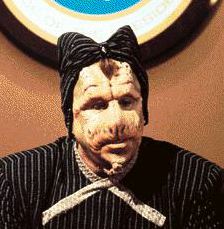Seeing The Way of the Warrior again after many years, I suddenly find an aspect to it that I didn't (and couldn't) see before. It's well known that Star Trek has always liked to tell stories as commentary on real life social and political events. But it seems in this case, DS9 prefigured a political development that was yet to come: The Iraq War.
After all, the episode revolves around the Klingon leader using the nebulous threat of the Dominion to invade Cardassia, based on skimpy evidence of a coup d'état there. Fearing involvement of the Dominion - and secretly desiring to increase the Klingons' base of power - he goes against the wishes of the galactic community and begins a war that severely damages the relationship between the Empire and the rest of the galaxy. Ultimately Sisko convinces Gowron that the war against Cardassia plays directly into Dominion plans to destabilize the Alpha Quadrant.
Isn't this somewhat similar to what happened in the months before the Iraq invasion? President Bush trying to assemble his coalition, seeking approval for his invasion plans, but running into skepticism especially from the EU, whose member states mostly warned that attacking Iraq would destabilize the region so much that al-Qaida would have a great opportunity to solidify its influence there - whereas the justification given for the war was the opposite: al-Qaida, according to Bush, was already there and working with the Saddam regime... which was of course, like in the DS9 version, proven to be untrue.
I know I'm reaching here, but aren't the parallels interesting? What do you think about "The Gowron doctrine"? Did he act out of genuine concern about the influence of an undetectable enemy or was it all a ploy to regain imperial stature? How about Bush?
And is Worf the Colin Powell in this, the one who, after some hesitation, goes against his own people because he doesn't believe they were justified?
After all, the episode revolves around the Klingon leader using the nebulous threat of the Dominion to invade Cardassia, based on skimpy evidence of a coup d'état there. Fearing involvement of the Dominion - and secretly desiring to increase the Klingons' base of power - he goes against the wishes of the galactic community and begins a war that severely damages the relationship between the Empire and the rest of the galaxy. Ultimately Sisko convinces Gowron that the war against Cardassia plays directly into Dominion plans to destabilize the Alpha Quadrant.
Isn't this somewhat similar to what happened in the months before the Iraq invasion? President Bush trying to assemble his coalition, seeking approval for his invasion plans, but running into skepticism especially from the EU, whose member states mostly warned that attacking Iraq would destabilize the region so much that al-Qaida would have a great opportunity to solidify its influence there - whereas the justification given for the war was the opposite: al-Qaida, according to Bush, was already there and working with the Saddam regime... which was of course, like in the DS9 version, proven to be untrue.
I know I'm reaching here, but aren't the parallels interesting? What do you think about "The Gowron doctrine"? Did he act out of genuine concern about the influence of an undetectable enemy or was it all a ploy to regain imperial stature? How about Bush?
And is Worf the Colin Powell in this, the one who, after some hesitation, goes against his own people because he doesn't believe they were justified?






